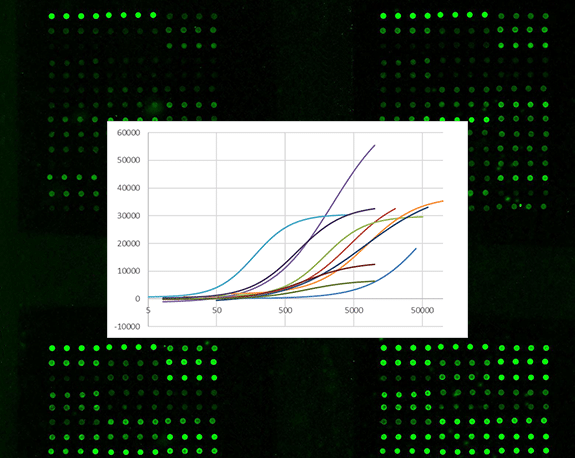
Quantitative Proteomics Services
50% off High-Density Proteomics Services
Use code 2024HD502 for half off Quantitative Proteomics Services and Discovery Proteomics Services through the month of November.
Contact us for a quote: techsupport@raybiotech.com
Develop deeper insights with precise, ultrasensitive, and quantitative proteomics services, delivered by the experienced scientists at RayBiotech.
With this service, you’ll get all the accuracy, sensitivity, and sample-conserving benefits of our GLP-compliant Quantibody® Multiplex ELISA platform with the efficiency and expertise of a reliable scientific partner.
We quantitatively detect up to 1200 human, 640 mouse, 282 rat, 50 porcine, or 30 bovine proteins, and ensure high-quality, reproducible results with our automated slide processing system and careful, thorough data analysis. Once your study is complete, you’ll receive a full report including all raw data and step-by-step calculations.
When to Choose Our Quantitative Proteomics Services
We recommend choosing this service when your project needs to obtain quantitative measurement of multiple proteins and/or you have low sample volume.
If you need to maximize the number of proteins analyzed and sample volume is not limiting, you may prefer our Discovery Proteomics Services.
Why You Should Choose Our Quantitative Proteomics Services
For Our Patented Quantibody® Multiplex ELISA technology
We provide this service using our Quantibody® platform, which is a glass slide array-based multiplex sandwich ELISA system that simultaneously quantifies multiple cytokines, growth factors, proteases, soluble receptors, and other proteins from a wide range of sample types.
The Quantibody® platform requires a mere 50 µL of sample to quantify up to 40 proteins in quadruplicate, making this array 80 times more efficient than a traditional ELISA.
For this service, we can use any of our Quantibody® Multiplex ELISA Array products or create a custom array.
See all of our Quantibody® Proteome Screening Arrays:
For Our Years of Experience
Founded in 2001 as the first company to commercialize the antibody array, we continue to use our decades of experience in multiplex, high-throughput protein analysis to deliver outstanding proteomics services to the research community.
What you can expect
RayBiotech’s Quantitative Proteomics Service process is streamlined and straightforward:
You
- Finalize your service agreement
- Prepare your samples for shipment—you can find instructions here.
- Fill out a Service Form and include it with your shipment.
- Ship us your samples (note that there is a 5 sample minimum for this service).
RayBiotech
- Once we receive your samples, we’ll send you an email.
- We’ll conduct your studies, keeping you informed about any issues or delays
- We’ll send back a detailed data analysis in Excel and PDF formats which includes:
- Standard curves for each analyte in addition to background subtraction/normalization
- All curves in both linear regression and log-log models so you won’t need to perform tedious calculations on each analyte
- Removal of outliers for greater accuracy
- Sample concentrations for each target
Ready for RayBiotech to start working on your Quantitative Proteomics Service?
Frequently Asked Questions
Still have questions?
Still have questions?
Featured Resources
Get additional information to help you advance your studies from articles on the science underlying antibody-based techniques to video protocols, application notes, and more.


